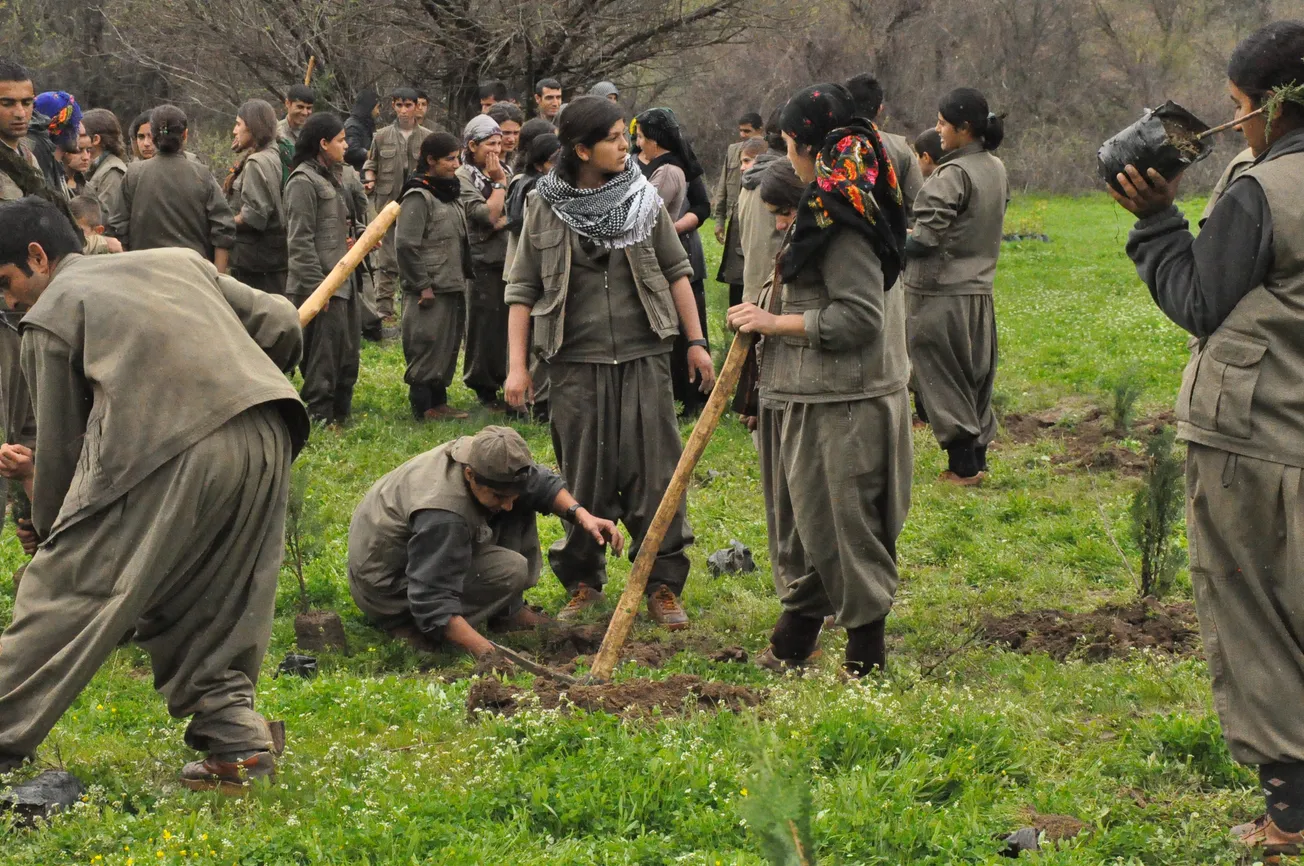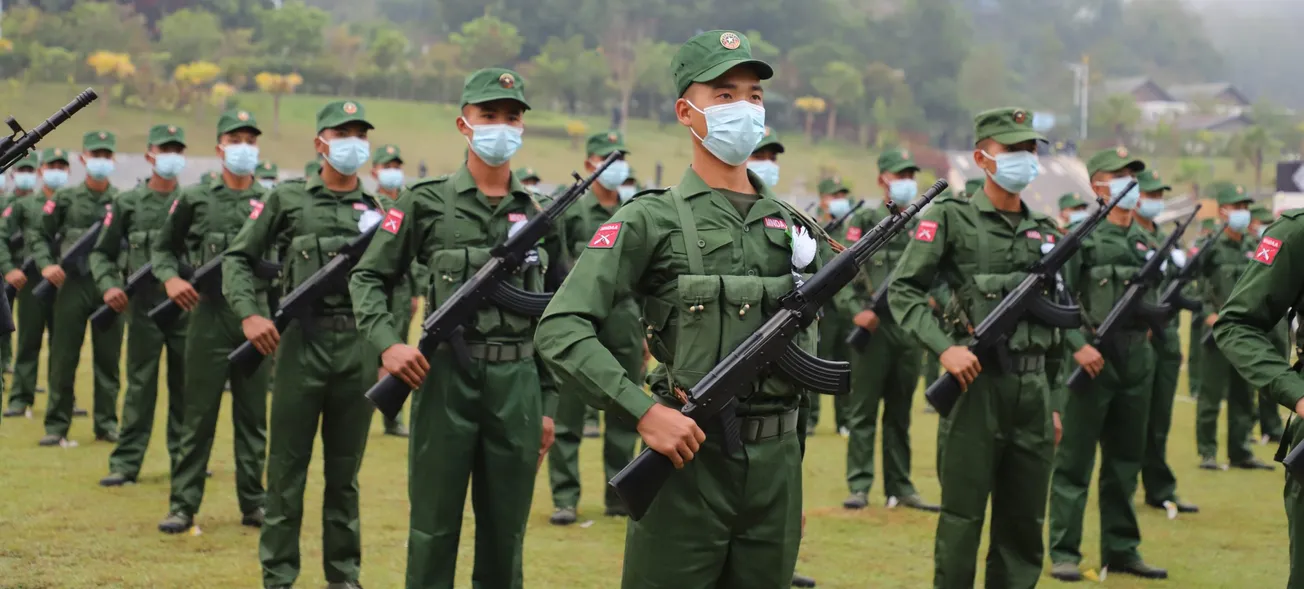Overview
The Kurdistan Workers' Party (PKK) is a Kurdish Marxist-Leninist militant political organization and armed guerrilla movement founded in 1978 in Turkey. Initially established with the goal of creating an independent Kurdish state, the PKK has since evolved its objectives to focus on greater autonomy and increased political and cultural rights for Kurds within Turkey. The group has been engaged in an armed conflict with the Turkish state since 1984, resulting in over 40,000 deaths, mostly Kurdish civilians.
The PKK is designated as a terrorist organization by Turkey, the United States, and the European Union, although this designation remains controversial among some analysts. The group's ideology blends Kurdish nationalism with elements of revolutionary socialism and Marxism-Leninism. Over the years, the PKK has demonstrated remarkable resilience and adaptability, surviving multiple military offensives, leadership changes, and shifting political landscapes.
As of 2025, the PKK remains a significant factor in regional security dynamics, with its influence extending beyond Turkey's borders into Iraq and Syria. The group's activities continue to impact Turkey's domestic and foreign policy, as well as its relationships with regional and international actors.
History
- Formation and Early Years (1978-1984): The PKK was founded on November 27, 1978, in the village of Fîs, Lice, by a group of Kurdish students led by Abdullah Öcalan. The group emerged from the broader context of Kurdish activism and leftist movements in Turkey during the 1970s. Initially, the PKK focused on building its ideological and organizational foundations.
- Armed Insurgency (1984-1999): On August 15, 1984, the PKK launched its armed insurgency against the Turkish state. This period saw intense conflict between the PKK and Turkish security forces, with the group employing guerrilla tactics in southeastern Turkey. The PKK's operations peaked in the mid-1990s, with the group controlling significant territory and garnering substantial support among the Kurdish population.
- Öcalan's Capture and Ceasefire (1999-2004): In 1999, PKK leader Abdullah Öcalan was captured by Turkish authorities, marking a significant turning point for the organization. Following Öcalan's arrest, the PKK declared a unilateral ceasefire and began to shift its strategy and goals.
- Renewed Conflict and Peace Process (2004-2015): The period from 2004 to 2015 was characterized by intermittent conflict and attempts at peace negotiations. In 2013, a formal peace process was initiated between the Turkish government and the PKK. However, this process ultimately collapsed in 2015, leading to a resumption of hostilities.
- Recent Developments (2015-2025): Since 2015, the conflict has become increasingly regionalized, with Turkey pursuing the PKK and its affiliates in Iraq and Syria. The PKK has adapted its strategies, focusing on both military operations and political activism through affiliated organizations.
Key Characteristics
- Ideology: The PKK's ideology combines Kurdish nationalism with elements of Marxism-Leninism and, more recently, democratic confederalism.
- Adaptability: The group has demonstrated a remarkable ability to adapt its strategies and organizational structure in response to changing circumstances.
- Transnational Nature: While primarily focused on Turkey, the PKK operates across borders, maintaining a presence in Iraq and Syria.
- Political-Military Structure: The PKK functions as both a political organization and an armed movement with a complex organizational structure.
- Use of Affiliated Organizations: The PKK operates through a network of affiliated groups in different countries, allowing it to extend its influence and avoid direct attribution of actions.
- Resilience: Despite numerous setbacks and military operations against it, the PKK has shown significant resilience and ability to regenerate its capabilities.
Key People/Actors
- Abdullah Öcalan: The founder and ideological leader of the PKK. Although imprisoned since 1999, Öcalan continues to exert significant influence over the organization.
- Murat Karayilan: The current de facto leader of the PKK, responsible for day-to-day operations.
- Cemil Bayik: A co-founder of the PKK and an influential figure within the organization's leadership.
- Duran Kalkan: A senior PKK commander involved in strategic decision-making.
- Fehman Huseyin: Leader of the PKK's military wing, the People's Defense Forces (HPG).
Key Capabilities and Tactics
- Guerrilla Warfare: The PKK excels in hit-and-run tactics and ambushes, leveraging its knowledge of the difficult terrain in southeastern Turkey and northern Iraq.
- Propaganda and Recruitment: The group employs sophisticated media strategies to promote its cause and recruit new members, particularly among Kurdish youth.
- Cross-border Operations: The PKK's ability to operate across national borders enhances its mobility and complicates counterinsurgency efforts.
- Urban Terrorism: While primarily a rural-based insurgency, the PKK has demonstrated the capability to conduct attacks in urban areas, including bombings and assassinations.
- Fundraising and Resource Mobilization: The PKK has developed extensive networks for fundraising, including diaspora communities and alleged involvement in drug trafficking.
- Use of Proxy Groups: The PKK has been associated with the formation of affiliated groups, such as the Kurdistan Freedom Falcons (TAK), which allows for plausible deniability in certain operations.
Outlook
As of early 2025, the PKK's position in the region's complex conflict landscape presents both challenges and opportunities:
- Persistent Conflict: Despite ongoing military operations against it, the PKK continues to pose a significant security challenge in Turkey and the broader region.
- Regional Dynamics: The PKK's activities in Syria and Iraq, particularly its affiliations with groups like the PYD/YPG, continue to impact regional politics and Turkey's relationships with its neighbors.
- Peace Process Prospects: While the previous peace process collapsed in 2015, the potential for future negotiations remains a subject of debate, influenced by both domestic Turkish politics and regional developments.
- Ideological Evolution: The PKK's adoption of democratic confederalism as its official ideology may continue to shape its strategies and appeal, particularly in areas where it has established de facto governance structures.
- International Attention: The PKK's role in the fight against ISIS and its affiliates' governance experiments in Syria has drawn increased international attention, potentially impacting how the group is perceived and engaged with by external actors.
- Technological Adaptation: The PKK's reported use of new technologies, including drones, may influence the nature of its future operations and the responses of its adversaries.
- Leadership Transition: As the PKK's founding generation ages, questions about future leadership and potential ideological shifts may become increasingly relevant.
- Economic Factors: The PKK's involvement in various economic activities will likely continue to play a crucial role in its ability to sustain operations.
The future trajectory of the PKK and its conflict with Turkey will depend on various factors, including regional political developments, the effectiveness of military and political strategies on both sides and the potential for renewed peace negotiations. As the situation continues to evolve, the PKK's actions and strategic decisions will play a crucial role in shaping the security landscape of Turkey and the broader Middle East region.










